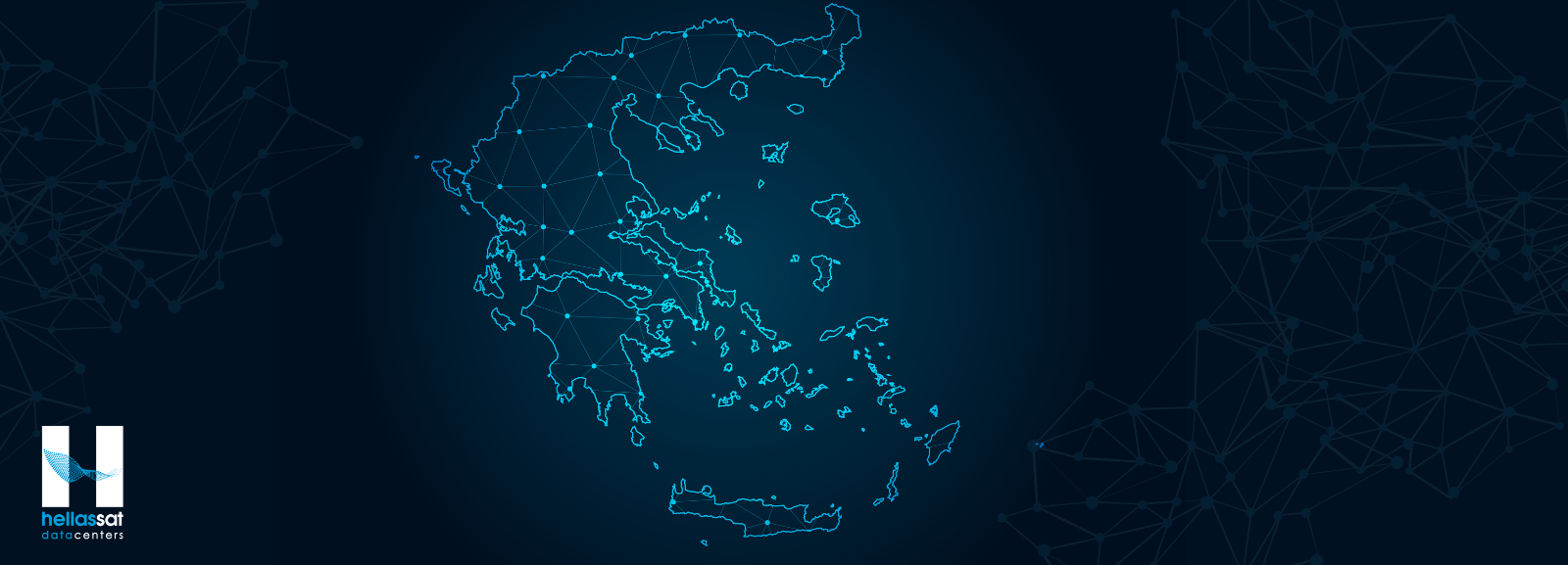
The Case of Rapid Data Center Growth in Greece
In today’s interconnected world, businesses rely heavily on data centers to power their operations, manage customer interactions, and process vast amounts of information. The physical location of these data centers plays a crucial role in determining the efficiency, security, and sustainability of business operations. This post explores the importance of Data Center location in general, in addition to the emerging expansion of the Data Center Market in Greece, leading the country to become the largest data hub in Southeast Europe, and the second largest in the Mediterranean area.
Let’s start by explaining the key reasons why selecting the right data center location matters for your business performance and continuity.
Reduced Latency and Enhanced User Experience
Latency refers to the delay between a user’s request and the response they receive. For businesses operating in sectors like e-commerce, streaming services, and cloud applications, even milliseconds of delay can have significant impacts on user experience and revenue. The proximity of data centers to end users directly influences data transfer speeds, reducing latency and ensuring faster response times.
Regulatory Compliance and Data Privacy
In an increasingly data-driven world, businesses must adhere to a variety of data protection regulations, including the General Data Protection Regulation (GDPR) in Europe and the California Consumer Privacy Act (CCPA) in the United States. These regulations impose stringent rules on how businesses handle and store personal data. Thus, the physical location of a data center can determine whether a business complies with these laws.
To be more specific regarding European Markets, the GDPR mandates that EU citizens’ data must be stored within the European Union or in countries deemed to have equivalent privacy protections (GDPR, 2016). Failure to comply can result in significant penalties—up to €20 million or 4% of annual global revenue, whichever is higher. Businesses must, therefore, choose data center locations that meet regional data privacy requirements to mitigate risks and ensure compliance.
Business Continuity and Disaster Recovery
Data centers situated in regions prone to natural disasters like earthquakes, floods, or hurricanes are at a higher risk of operational disruption. Selecting a location in a geographically stable area reduces the risk of service outages and ensures business continuity during unforeseen events.
Research by the Uptime Institute indicates that downtime costs for data centers can reach up to $9,000 per minute (Uptime Institute, 2023). Geographically dispersed data centers, particularly in stable regions, offer redundancy and the ability to back up critical data, ensuring that business operations can continue even during a disaster. By investing in strategic locations, companies can maintain uptime—a key requirement in the digital economy.
Energy Efficiency and Cost Reduction
The location of a data center significantly impacts its operational costs, particularly with regard to energy consumption. Data centers consume large amounts of electricity to run servers and keep systems cool. As a result locating data centers in regions with affordable, sustainable energy sources helps businesses reduce costs while contributing to a greener digital economy.
Access to Skilled Workforce
Another significant consideration when choosing a data center location is the availability of a skilled workforce. Data centers require constant monitoring and maintenance by highly trained IT professionals. A study by CBRE Group highlights that regions with a strong tech workforce are becoming increasingly popular for data center investments due to the availability of expertise in managing complex IT infrastructure (CBRE, 2023). A well-trained workforce is essential for handling emerging technologies like artificial intelligence (AI) and machine learning (ML), which are becoming integral to data center operations.
Connectivity to Major Markets and Security Considerations
Data centers located near major internet exchanges or in regions with robust infrastructure benefit from faster and more reliable connectivity. This is crucial for businesses that rely on global markets and require seamless access to international customers. According to Cisco’s Global Cloud Index, businesses with high-speed connections and low latency are better equipped to expand into new markets and deliver superior user experiences (Cisco, 2023).
Security is another critical factor. Data centers in politically stable, secure locations are less susceptible to both physical breaches and cyberattacks. The cost of a data breach in 2023 is estimated at $4.45 million, according to IBM’s Cost of a Data Breach Report (IBM, 2023). Ensuring that data centers are located in regions with strong cybersecurity and physical security measures can significantly reduce risks for businesses.
Edge Computing and the Future of Data Centers
The rise of edge computing is transforming the way businesses process data. Unlike traditional centralized data centers, edge computing brings data processing closer to the source, reducing latency and improving bandwidth efficiency. This is particularly important for real-time applications like autonomous vehicles, the Internet of Things (IoT), and augmented/virtual reality (AR/VR) technologies.
A report by IDC predicts that by 2025, 75% of enterprise-generated data will be processed at the edge rather than in traditional centralized data centers (IDC, 2022). Edge computing not only improves response times but also enhances security by allowing sensitive data to be processed locally, minimizing exposure during transmission.
The Emergence of Greece as a Leading Data Center Hub in Southern Europe
After analyzing why location matters in choosing the right data center for your business needs, it is time to focus on why Greece has positioned itself as a key player in the Data Center market of southern Europe.
Strategic Geographical Location and Global Connectivity
One of the main reasons for Greece’s rise as a data center hub is its strategic location at the crossroads of Europe, the Middle East, and Africa. This advantageous position allows for low-latency data transmission between major regions, making it an ideal location for businesses looking to serve global markets. Greece’s location also enables it to serve as a key data transfer point for international companies that require fast and reliable connections.
Moreover, Greece is connected to several international submarine fiber-optic cables, including the Asia-Africa-Europe-1 (AAE-1), which links Europe with Asia and Africa. This network significantly improves the country’s connectivity and enables faster data transfers across continents. According to TeleGeography (2022), the AAE-1 submarine cable project has bolstered Greece’s telecommunications infrastructure, positioning the country as a growing regional hub for data transfer. These cables play a crucial role in facilitating the flow of information between continents, and Greece’s strategic placement along these routes makes it a prime location for data centers.
Compliance with European Data Protection Regulations (GDPR)
Another factor driving Greece’s emergence as a data center hub is its compliance with the General Data Protection Regulation (GDPR). As a member of the European Union, Greece fully adheres to GDPR, one of the world’s most stringent data protection frameworks. This ensures that businesses storing or processing data within Greece are in full compliance with European privacy laws.
GDPR mandates strict requirements for how personal data is collected, stored, and transferred, particularly within the European Economic Area (EEA). For international businesses operating in or dealing with European customers, choosing a data center location within a GDPR-compliant jurisdiction is critical to avoiding legal penalties and ensuring secure data management. According to a European Commission (2023) report, Greece has fully implemented GDPR, making it a secure and reliable destination for data storage.By adhering to these data protection standards, Greece provides a trusted environment for businesses that handle sensitive data, further enhancing its appeal as a data center hub for European and international markets.
Seismic Resilience and Business Continuity
While Greece is located in a seismically active region, the country has made significant progress in ensuring that critical infrastructure, including data centers, is built to withstand natural disasters. This is an essential consideration for businesses that require reliable data center operations with minimal downtime. Modern data centers in Greece are designed to be highly resilient to earthquakes and other natural disasters. A report by the Greek Seismological Institute (2022) highlights improvements in seismic engineering, which have made Greek data centers capable of maintaining operations even in the event of natural disruptions. These centers are equipped with redundant systems and backup power solutions to ensure business continuity.
The ability to maintain uptime and data security during unexpected events is crucial for businesses, and Greece’s focus on seismic resilience enhances its attractiveness as a safe and reliable location for data centers.
Competitive Operational Costs and Government Support
One of the primary concerns for businesses operating data centers is the cost of electricity and infrastructure. Greece offers a competitive advantage in terms of lower energy costs compared to other Western European countries, making it a cost-effective location for data-intensive operations. This is particularly important for businesses looking to optimize their operational expenses while maintaining high performance.
In addition to lower energy costs, the Greek government has introduced several initiatives to encourage foreign investment in its technology and telecommunications sectors. According to Enterprise Greece (2023), the government offers tax relief, subsidies, and grants for businesses investing in data centers, particularly those that prioritize sustainability and energy efficiency. These financial incentives make Greece an attractive location for global tech companies seeking to establish or expand data center operations in Europe.
Access to a Growing Technological Ecosystem and Skilled Workforce
Last but not least, a key factor contributing to Greece’s rise as a data center hub is its access to a growing pool of skilled IT professionals and a burgeoning technological ecosystem. Greece’s universities and research institutions produce a steady flow of highly trained engineers and IT specialists, ensuring that businesses operating data centers in the country have access to the talent needed to manage and maintain their infrastructure.
Why choose Hellas Sat as your Data safe house in Greece
Hellas Sat’s HS-GR4 Tier IV Data Center In Koropi, Athens, Greece provides the perfect infrastructure for businesses looking for a secure, reliable, and cutting-edge solution in a strategically located hub. Whether you need a colocation plan or a tailor made solution based on your business needs, Hellas Sat is committed to ensure that your data and operations remain protected and efficient.
Bibliography
CBRE Group (2023) Data Center Market Trends and Workforce Requirements. Available at: https://www.cbre.com
Cisco (2023) Global Cloud Index: Forecast and Methodology 2016-2023. Available at: https://www.cisco.com
European Commission (2023) Data Protection in the EU: Overview of GDPR Compliance. Available at: https://ec.europa.eu
GDPR (2016) General Data Protection Regulation (EU) 2016/679. Official Journal of the European Union. Available at: https://gdpr-info.eu
Greek Seismological Institute (2022) Advances in Seismic Resilience for Critical Infrastructure. Available at: https://www.earthquakeresilience.gr
IBM (2023) Cost of a Data Breach Report. Available at: https://www.ibm.com
IDC (2022) FutureScape: Worldwide Data Center Predictions 2022-2025. Available at: https://www.idc.com
TeleGeography (2022) Global Submarine Cable Map and Connectivity Insights. Available at: https://www.telegeography.com
Uptime Institute (2023) Annual Data Center Survey and Downtime Cost Analysis. Available at: https://www.uptimeinstitute.com
Enterprise Greece (2023) Investment Opportunities in Greece’s Technology and Telecommunications Sector. Available at: https://www.enterprisegreece.gov.gr




